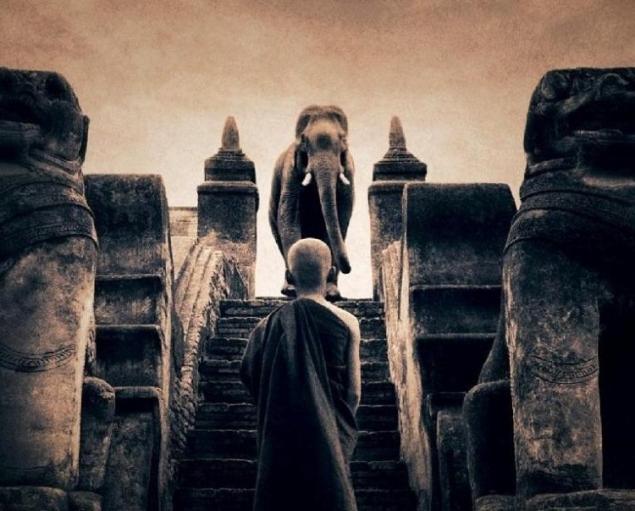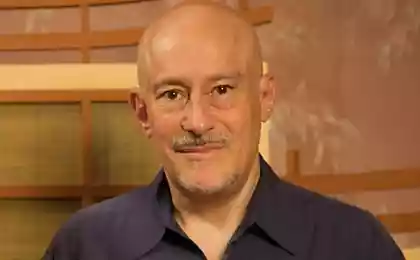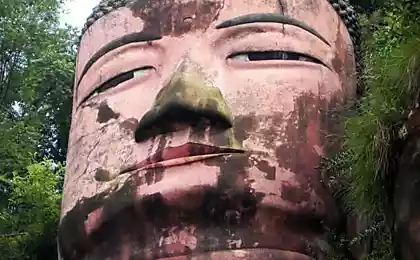835
Jack Kornfield: 10 signs of spiritual maturity
Ripe fruit falls from the tree: signs of spiritual maturity When one reaches maturity in the spiritual life, he is more comfortable with paradox, more correctly understands the uncertainty of life, its many layers and deep conflicts. In the fullness of his heart develops a sense of life's irony, metaphor and humor, the ability to cover the whole with its beauty and offensiveness".
A ripe fruit falls naturally from the tree.
After an appropriate period of spiritual life the heart, like the fruit begins to Mature and acquire sweetness.

Our practice goes from rough green shoots of searching, developing and improving ourselves – a peaceful stay secret. She is moving from reliance on form to stay in the heart.
To reach spiritual maturity means to become free from the stationary and idealistic ways of being and open to your life of flexibility and joy. With the development of spiritual maturity heart becomes kindness. The ease and compassion become our natural movement.
TaoistLao Tzu praised the spirit when he wrote:
"Woman, centered in Tao, can safely go wherever you want. She perceives the universal harmony, even amid great pain, because we've found peace in your heart."
The fulfillment of the rituals with robes and philosophy of spiritual traditions, people tried to escape from their everyday life and become more spiritual beings.
Spirituality is not about to leave my life and find existence on a higher level, filled with light. We found that transformation of consciousness requires much more practice and discipline than we first thought. We began to see that the spiritual path requires us to be more than what, apparently, offers. People have begun to awaken from the romantic visions of practice and understand that spirituality requires an honest and bold opinion, insight into the depth of the situations of our real life, in the depth of family situations, from which we come, requires a look at the place that we occupy in the society around us. Individually and in communities, through increasing wisdom and experience of being liberated from illusion, we begin to discard the idealistic understanding of spiritual life and spiritual community as a means to withdraw from the world or to save himself.
For many of us, this transition became the basis for a more deeply integrated and more intelligent spiritual work, which includes right relationship, right livelihood, right speech, and ethical dimensions of spiritual life. This work demanded the end of the categorization, understanding the fact that all that we are trying to push into the shadows or whatever you want to avoid, should ultimately include in their spiritual life, and nothing to leave behind. Spirituality has become more a question of who we are than about what ideal to follow. Spirituality changed our direction, instead to go to India, to Tibet, or Machu Picchu, we come home.
Spirituality of this kind, full of joy and integrity — and it is ordinary, and awakened. This spirituality enables us to abide in the miracle of life. Such a Mature spirituality allows you to Shine through us the light of the divine. Let's take a look at the quality of spiritual maturity.
1. The absence of idealism
Mature heart does not seek for perfection — it is in the compassion of our being instead of dwell in the ideals of the mind. Spirituality, devoid of idealism, does not seek to perfect the world, not seeking to improve myself, my body, my personality. She's not a romantic, dreams about teachers or about enlightenment, based on the images of great purity of some otherworldly being. Thus, it is not seeking any purchase or special achievements in the spiritual life – it seeks only to love and be free.
Disappointment in the quest for perfection is illustrated by a story about Mullah Nasreddin:
"One day he met in the market with his old friend that was to marry. A friend asked the Mullah whether he thought it ever about marriage. Nasrudin replied that years ago he was going to marry and began to look for the perfect woman. First he went to Damascus, where he found the woman, who had perfect grace and beauty; but she found flaws in the spiritual realm. Then the journey led him even further to Isfahan, where he met a woman of deep spirituality, but quite adapted to this world and beautiful; but, unfortunately, they have not found common language with each other. "Finally I found it in Cairo,' he continued. – It was the ideal woman, spiritual, gracious and beautiful; it is easily felt in this world, she was perfect in every way". "So what? – asked the other. – You married her?" "No, answered the Mullah. – Unfortunately, she was looking for the perfect man".
Mature spirituality is not based on seeking perfection, on achieving some imaginary sense of purity. It is based just on the ability to be free and to love, to open my heart to all that is. Without ideals, the heart is able to turn common suffering and imperfections in the way of compassion. In this free from idealism to practice the divine can Shine even in acts of ignorance and fear, encouraging us to wonder at everything, and his secret.In this there is no condemnation, no censure, because we do not seek to improve the world, and trying to improve their love to what is on this earth.

Thomas Merton saw this:
"Then it happened as if I suddenly saw the secret beauty of their hearts, the depths of which are not able to reach neither sin nor desire; it is personality, what is each person in the eyes of God. If only they could see themselves for what they really are, if we only see this way to each other, there would be no reason for war, for hatred, for cruelty... I believe that there would be a big problem: we would have fallen on his knees, worshiping each other".
2. The second quality of Mature spirituality is kindness.
It is based on the fundamental notion of recognition itself, and not on the concepts of guilt, blame or shame for the actions of ignorance that we have committed or the fears that still remain within us. We understand that the opening requires the warm sun of loving-kindness. Very easy to turn spirituality and religion into what Alan watts called "bad debt". The poet Mary Oliver wrote:
"... You don't have to be good.
It is not necessary to repent and crawl on my knees
A hundred miles through the desert –
You just have to let the soft animal of my body
Love what it loves..."
In deep recognition grows compassionate understanding. As one Zen master, when asked if he gets angry someday: "of Course, I'm mad; but then a few minutes later I say to myself: "What's the use!" and release the anger". This recognition is, at least half of our spiritual practice.We are required to we with charity touched many parts of themselves that were previously denied, cut off or isolated. Mature spirituality is a reflection of our deep gratitude and capacity for forgiveness. According to the Zen poet Edward espe brown in the "Book the cook Masaharu":
"At any time when we are preparing this food,
We can turn into gas
And cock in the air at thirty thousand feet,
To drop poisonous dew
The leaves on the branches on the fur.
And everything we see will disappear.
And still we prepare food
Put on the table a thousand dreams,
To nourish and soothe
Near and dear to our hearts.
In this step, cooking
I bid you farewell.
I always insisted
That you deserve only censure.
But in this last moment my eyes opened,
And I look at you
With all the tenderness and forgiveness,
That so long kept in itself,
Look no future.
We have nothing
For that you need to fight..."

3. The third quality of spiritual maturity is patience.
Patience gives us the ability to live in harmony with Dharma, the Tao. As argued by Chuang Tzu:
"The true men of old
Had no intention to fight with Tao,
But not tried their own tricks
To promote its implementation".
Zorba the Greek says about his own lesson of patience:
"I remember one morning I found in the bark of a tree a cocoon when the butterfly was done the hole in its shell and prepared to go outside. Some time I waited, but the wait seemed far too long and I was impatient. I leaned over to the cocoon and began to breathe on it to warm up. I warmed it as quickly as I could; and before my eyes started to happen a miracle – it was ahead of life. The shell is opened, the butterfly started slowly to get out; and I will never forget my horror when I saw how its wings fell off and crumpled; the wretched butterfly tried to deploy them to all your throbbing body. Leaning in to her, I tried to help her breathe. In vain! Had to wait patiently for its release into the light; the disclosure of the wings had to occur on the sun during a gradual process; but now it was too late. My breath had forced the butterfly to be born prematurely and all wrinkled. It struggled desperately and a few seconds later died on the palm of my hand".
Spiritual maturity implies an understanding of the fact that the process of awakening goes through many periods and cycles. It requires our deepest commitment requires that we occupy in the heart is only one place and revealed to each particle of life.
True patience does not acquire and does not crave, it does not aspire to any achievement. Patience allows us to open up for a timeless.
When Einstein explained the example about the nature of time, he said, "If you sit with a pretty girl for two hours, they seem minute; but if you sit on a hot stove, a minute seems like two hours. This is relativity".
"The problem with the word "patience," said the Zen master Suzuki-Roshi, – is that it implies that we are waiting for something, waiting for some improvement, the arrival of something good. A more accurate word for this quality is "permanence", the ability moment by moment to be with what is true, open up the enlightenment in one moment after another." Deeply we realize that what we seek is what we are; and it is always there.
4. The fourth quality of spiritual maturity – is the immediacy.
Spiritual awakening is in our own lives here and now. In the tradition of the Zen saying: "After ecstasy – the Laundry". Spiritual maturity manifested in the immanent, and the transcendental; it is manifested in the desire to give the opportunity for the divine to Shine in our every action. Altered States of consciousness and unusual experiences of the mind, great raskrutitsya not for their own sake, but only to the extent that they return us to our human incarnation is to tell something of our wisdom and deepen our capacity for compassion. As said achaan Cha, "even the extraordinary experiences are useless and are something that should be exempted, if they are not connected with this moment here and now." Spiritual States are honored when they cleanse the vision and reveal the body and mind, but they are only a transition to return to the timeless present.
In the immediate present Mature spirituality allows us to "walk in their conversation," i.e., to act, to speak and touch each other, reflecting in its deepest sense. We become more alive and more present. We discover that our very breath and body, our limitations are part of the divine life. This maturity is listening to our body and loving this body – the body of enjoyment and body of sadness; she listens to heart and loves the heart's ability to feel.
5. The fifth quality of spiritual maturity is the sense of the sacred, universal and personal.
It is "comprehensive" in the sense that it does not create a separate from each other parts of our lives, not separate what is sacred from what is not; it is "personal", because it honors the spirituality in our own words and actions. Otherwise our spirituality has no real value. Comprehensive and personal spiritual practice includes our work, our love, our family and our creativity. It becomes clear that the personal is inextricably linked with the universal that the universal truths of spiritual life can stay alive only in each particular and personal circumstance. How we live is our spiritual life.
As one clever student, "if you really want to know something about a Zen master, talk to his wife."
An all-encompassing sense of spirituality is understanding of the fact that if we need to make in the world of light and compassion, we must start it with his own life.Our personal lives become more authentic spiritual practice, rather than any motive we had experiences or some kind of shared philosophy. A personal approach to practice is respect for the individual and the universal in our lives: we respect life as a non-permanent dance between birth and death; but we read also of their own body, their own family and community, and personal history given to us of joy and sorrow. Thus our personal awakening is a fact which affects all other creatures.
In the Amazon jungle there are nine hundred different species of wasps and each species pollinating a separate form and a separate view of Fig. These Fig trees are the main source of food for all small mammals in tropical forests, these small mammals in turn provide the basis of life for jaguars, monkeys, wild pigs and other animals. Every kind of OS maintains a chain of other animals. Similarly, every individual in this world brings to life one of a kind contribution. The exercise of the spiritual life can never come through imitation; this life must Shine through our particular gifts and abilities men and women on this earth. It is the pearl of great value. Honoring your own one of a kind destiny, we allow his most personal life to become an expression of the Buddha in a new form.

6. The sixth quality of spiritual maturity is a sense of exploration.
Instead adopt some kind of philosophy or blindly follow some great teacher, go on insurmountable, we need to recognize that we need to see ourselves. It is the quality doubt, the Buddha called the Dhamma-vicaya, our study of the truth. It is the willingness to open what it is without imitating, without having to follow the wisdom of others. Somebody once told Picasso that he should paint things, portraying the latter as what they are, write an objective picture. When Picasso said that he does not understand what the matter was, the man pulled out the wallet photo of his wife and said: "see, that's her image, it is in reality." Picasso looked at the photo and said, "She's quite small, isn't it? And flat?" Like Picasso, we have to see things for yourself.
In spiritual maturity we find a great sense of autonomy – not as a reaction to the authority, and as the basis for a sincere recognition of the fact that we, like the Buddha, is able to Wake up. Mature spirituality has deeply democratic quality: all individuals have the ability to access what is sacred, and to break free.
This sense of research combines the openness of mind, the so-called "ignorant" mind of Zen, with "discriminating wisdom", the ability to separate the useful from the harmful, which keeps your eyes open in order to learn. With an open mind we are always learning.
Our sense of research gives us the opportunity to use the great wisdom traditions to learn from teachers and be part of the community, while at the same time in contact with ourselves, to see the truth and speak the truth with great respect to my integrity and to my own awakening. This study may not lead us to more confidence; however, it is able to allow us to be more honest with ourselves; and in this point our spiritual practice is brimming with interest and vitality.
7. The seventh quality of spiritual maturity is flexibility.
Spiritual maturity allows us to move in the wind, like bamboo, to respond to the world with his understanding and his heart, to respect changes in the surrounding circumstances. The spiritually Mature person has learned the great arts presence and liberation; its flexibility lies in understanding the fact that there is not only one way of practice, not only in spiritual tradition, and there are many ways. Its flexibility implies that the spiritual life is not to accept some particular philosophy or set of beliefs or doctrines, not to to resist someone or something to oppose. It is the lightness of heart, which implies that all the spiritual means the essence of rafts to cross the stream and come to freedom.
In his earliest dialogues of the Buddha warned against the mixing of the raft to the shore, against the adoption of any stable opinion or view.He continued: "How can anything contradict the sage, which does not accept any opinion?" Instead of arrogance, the Buddha recommends the freedom and reminds his followers that people who are passionately seeking a particular philosophy or view of life, just wandering around in this world, disturbing others.The flexibility of the heart contributes to the spiritual practice of humor. It allows us to see that there were a hundred thousand skillful means to Wake up that there is a time for formal and systematic ways – and the time for the improvised, unusual and extreme means.
Future coach of the University basketball team Ron Jones learned that lesson, taking the lead centre for the training of persons with disabilities in San Francisco. He intended to train his team to great victories – but the first day found that training was only four players, one of them is in a wheelchair. This initial impasse was overcome when the men's bathroom came a dark-skinned woman with a height of six feet and demanded to be included on the team. The coach says, as he refused to plan his first lesson, when I saw that it took him forty five minutes to install all five players in a line on one side of the courtyard with their eyes turned in the same direction. But when he rejected their plans, the basketball team has increased. The team was practical, a cheerleader, sausages; although often they had a crew of seven or twelve players instead of five. Sometimes they would stop playing in the middle of a meeting, to play music and invite everyone to dance. And in the end they are the only basketball team in history who won with a difference of a million points, when one of its members who thought glasses were entertained that pushed the button indicator of the account and called with every hit of the ball in the basket.
Cheap got easily lost. In this flexibility there is a great freedom. Teacher achaan Cha said of himself that he plays the role of a tree – bearing fruit, allows the birds to nests, bent in the wind. Dharma flexibility of joyful and peaceful.
8. Eighth quality of spiritual maturity – the quality of the coverage of opposites, the ability to accommodate in the heart of the contradictions in life.
In early childhood, we see his parents, or the entire good, if they give us everything we want, or entirely bad, when they disappoint our desires and do not act the way we want. Significant development of consciousness of children, enables them to eventually clear to see my parents and realize that in one and the same person there is both good and bad, love and hate, generosity and fear. A similar development is taking place and then when we reach maturity in spiritual practice. We are looking for committed teachers, gurus, possessing perfect wisdom, not trying to find something nice and completely the opposite of what is totally bad we do not separate the victim from the abuser. We begin to understand that every phenomenon contains its opposite.
One young woman who's a victim of abuse in his own family, spent a significant part of their spiritual practice to heal from your pain. As part of this treatment, she became a counselor for other victims of abuse, and in the end started to work by the offenders and criminals. In the first year of working with the last group, almost all of it was from men, it was clear that right and wrong, what is unacceptable, who committed the crime.

However, as practice continued, the more she listened attentively to the narratives of perpetrators of violence – and found that almost every one of them he experienced in childhood abuse. And here she was sitting in a room surrounded by men age forty, fifty, or sixty years – but essentially the room was full of disgruntled children.
Shocked, she discovered that many of them were subjected to the cruelty of their mothers; continuing to further explore their stories, she found that the mother suffered from the cruelty of their fathers and uncles in their homes; found a sad stereotypes, insults, going to the past generation after generation. What could she do? Now I had someone to blame?And all she had to do – say forcefully: "No, these actions must not continue," and then hold his a compassionate heart both the offender and offended all in one.
When a person reaches maturity in the spiritual life, he is more comfortable with the paradoxes, more correctly understands the uncertainty of life, its many layers and deep conflicts. In the fullness of his heart develops a sense of life's irony, metaphor and humor, the ability to embrace his benevolent heart whole with its beauty and its extremes.
This is the paradox of life is always here in front of us. The well-known story about a Zen master, the disciple asks the wizard: "Please, master, tell me about enlightenment." And here they are marching through the pine forest, and the master gives the answer. He points to the pine: "you See how high this pine?" "Yes," answers the student. Then, the wizard points to another. "You see how low this pine?" "Yes," again replies the student. "This is enlightenment"– said the master.
When we cover the opposite side of life, we are enclosing the indivisibility of his own birth and death, joy and suffering. We honor the sacred in emptiness and form; we understand the dictum of the Sufis: "Praise Allah, but tie your camel to the post". When our spiritual practice becomes more Mature, we learn to allow the other party to this practice – needs teacher and need themselves to take responsibility for their own spiritual practice, transcendental States of consciousness and the need to implement them in a personal action, the force of karmic causation and the ability of the human freedoms is to be part of the dance of our spirit, to keep it all with ease and humor, to be at peace with all.
9. Further understanding of the Mature spiritual life we find in the relationship.
We are always in relationship with something. In the opening of reasonable and sympathetic relationship with all things we find the ability to respect them all. Having only a little power over the majority of incidents in our lives, we can choose the attitude to their feelings. Mature spirituality is the acceptance of life in relationships. With a willingness to enter into a relationship with all things, we enter into the generous spirit of the practice, where everything is considered sacred. Our family life, our sexuality, our community, the environment, land, politics, money and our relationship with every creature and every action becomes an expression of the Tao, the Dharma.
Master Zen thiti Nhat Han loves to remind us about how we wash the dishes, "Can we wash each Cup or bowl," he asks, " as if we were bathing a newborn Buddha?" Every action has a meaning, and all we found is related to our spiritual life as a whole. Similarly, care and compassion with which we treat oncoming difficulties and problems, are the measure of our practices. Spiritual maturity respects our human community and interrelatedness. Nothing can be excluded from our spiritual life.
10. Last quality of spiritual maturity is the quality of everyday life.
In some traditions this is called practice after enlightenment; it is routine that occurs after faded special spiritual status and side effects. Nisargadatta, the great master of non-duality, the question of how his own consciousness different from the consciousness of seekers around him, smiled and replied: "I ceased to identify with the seeker".
Yes, he continued, he usually sits and waits for Breakfast, waiting for lunch; yea, he is hungry and impatient, like others; but in the depth and around all this there is an ocean of peace and understanding. He is never captured any changed conditions of his life, does not identify himself with them; and thus, in contrast to the people around him, whatever happens, Nisargadatta is at rest.
Routine is a simple presence in this moment that allows the mystery of life to show themselves. When Thoreau warns us to "beware of such activities, which requires the purchase of a new suit", he reminds us that simplicity is the way to our disclosure for everyday miracle. Although we can read the ability of consciousness to create an infinite variety of forms, routine interested in what is here and now.
It's a common mystery of breathing or walking, the mystery of the trees on our street or the mystery of our love to any loved one. It is not based on attaining mystical States or extraordinary power, aspires to become something special, it devastates us when we listen.
Walt Whitman celebrates the commonplace in his poetry:
"I believe a leaf of grass is no less chore stars...
And that BlackBerry is worthy to be heavenly living room decoration...
And that mouse is a miracle that one could combat sextillion unbelievers."
(TRANS. K. I. Chukovsky)
The ordinariness of spiritual life comes from a heart that has learned to trust, from gratitude for the gift of human life. When we are just ourselves, without pretensions or gimmicks, we are alone in the universe. In this ordinariness there is no higher or lower; there is nothing to define, nothing to desire; it is simply openness in love and understanding to the joys and suffering of this world. This ordinary love, this is the usual understanding make in every situation the ease and peace of the heart. This discovery of the fact that our salvation lies in the ordinary. Like water, the Dao, which breaks through rocks or destroys them slowly and gradually drains into the ocean, this ordinariness brings us to peace.
In everyday life lies a great force, great energy of spiritual maturity. Comes the natural ability of self-medication; and as of course our spiritual equilibrium and compassion extends to the world around us.
Favorite Japanese poet Ryokan Zen filled life the spirit of everyday life and transform those with whom in contact. They say that Ryokan never preached, never uttered.
Once a brother asked Ryokan to visit his house and talk to his dissolute son. Ryokan came but did not say anything to appeal to the conscience of the youth. He stayed the night and was ready to go the next morning. When naughty nephew was laced up At straw sandals, he felt that it fell a drop of warm water. Glancing up, he saw that Ryokan looks at him all teary-eyed. Ryokan then returned home, and the nephew changed for the better.
Spiritual maturity grows and deepens our ability to open up, to forgive, to be free. This is a natural solution of our conflicts, natural elimination, natural relief of our difficulties, the ability of returning to a joyful and relaxing holiday.
The ancient wisdom of "Tao te Ching" teaches us:
"I need to teach only three things:
Simplicity, patience, compassion.
These three things are your greatest treasures.
Simple in actions and in thoughts,
You're going back to the source of being.
Patient to friends and enemies,
You are in agreement with the mode of existence of things.
Showing compassion to yourself
You reconcile all beings in this world.
So the sage, being in the Tao,
Is an example for all beings.
Since it does not display herself,
People can see his light,
Because he has nothing to prove
People can trust his words.
Because he doesn't know who he is
People recognize themselves in it.
Because in his mind there is no purpose,
Everything he does, brings success." published
Author: Jack Kornfield,from the book "Path with heart"
photo:©Gregory Colbert
P. S. And remember, just changing your mind — together we change the world! ©
Source: sobiratelzvezd.ru/priznaki-duxovnoj-zrelosti/
A ripe fruit falls naturally from the tree.
After an appropriate period of spiritual life the heart, like the fruit begins to Mature and acquire sweetness.

Our practice goes from rough green shoots of searching, developing and improving ourselves – a peaceful stay secret. She is moving from reliance on form to stay in the heart.
To reach spiritual maturity means to become free from the stationary and idealistic ways of being and open to your life of flexibility and joy. With the development of spiritual maturity heart becomes kindness. The ease and compassion become our natural movement.
TaoistLao Tzu praised the spirit when he wrote:
"Woman, centered in Tao, can safely go wherever you want. She perceives the universal harmony, even amid great pain, because we've found peace in your heart."
The fulfillment of the rituals with robes and philosophy of spiritual traditions, people tried to escape from their everyday life and become more spiritual beings.
Spirituality is not about to leave my life and find existence on a higher level, filled with light. We found that transformation of consciousness requires much more practice and discipline than we first thought. We began to see that the spiritual path requires us to be more than what, apparently, offers. People have begun to awaken from the romantic visions of practice and understand that spirituality requires an honest and bold opinion, insight into the depth of the situations of our real life, in the depth of family situations, from which we come, requires a look at the place that we occupy in the society around us. Individually and in communities, through increasing wisdom and experience of being liberated from illusion, we begin to discard the idealistic understanding of spiritual life and spiritual community as a means to withdraw from the world or to save himself.
For many of us, this transition became the basis for a more deeply integrated and more intelligent spiritual work, which includes right relationship, right livelihood, right speech, and ethical dimensions of spiritual life. This work demanded the end of the categorization, understanding the fact that all that we are trying to push into the shadows or whatever you want to avoid, should ultimately include in their spiritual life, and nothing to leave behind. Spirituality has become more a question of who we are than about what ideal to follow. Spirituality changed our direction, instead to go to India, to Tibet, or Machu Picchu, we come home.
Spirituality of this kind, full of joy and integrity — and it is ordinary, and awakened. This spirituality enables us to abide in the miracle of life. Such a Mature spirituality allows you to Shine through us the light of the divine. Let's take a look at the quality of spiritual maturity.
1. The absence of idealism
Mature heart does not seek for perfection — it is in the compassion of our being instead of dwell in the ideals of the mind. Spirituality, devoid of idealism, does not seek to perfect the world, not seeking to improve myself, my body, my personality. She's not a romantic, dreams about teachers or about enlightenment, based on the images of great purity of some otherworldly being. Thus, it is not seeking any purchase or special achievements in the spiritual life – it seeks only to love and be free.
Disappointment in the quest for perfection is illustrated by a story about Mullah Nasreddin:
"One day he met in the market with his old friend that was to marry. A friend asked the Mullah whether he thought it ever about marriage. Nasrudin replied that years ago he was going to marry and began to look for the perfect woman. First he went to Damascus, where he found the woman, who had perfect grace and beauty; but she found flaws in the spiritual realm. Then the journey led him even further to Isfahan, where he met a woman of deep spirituality, but quite adapted to this world and beautiful; but, unfortunately, they have not found common language with each other. "Finally I found it in Cairo,' he continued. – It was the ideal woman, spiritual, gracious and beautiful; it is easily felt in this world, she was perfect in every way". "So what? – asked the other. – You married her?" "No, answered the Mullah. – Unfortunately, she was looking for the perfect man".
Mature spirituality is not based on seeking perfection, on achieving some imaginary sense of purity. It is based just on the ability to be free and to love, to open my heart to all that is. Without ideals, the heart is able to turn common suffering and imperfections in the way of compassion. In this free from idealism to practice the divine can Shine even in acts of ignorance and fear, encouraging us to wonder at everything, and his secret.In this there is no condemnation, no censure, because we do not seek to improve the world, and trying to improve their love to what is on this earth.

Thomas Merton saw this:
"Then it happened as if I suddenly saw the secret beauty of their hearts, the depths of which are not able to reach neither sin nor desire; it is personality, what is each person in the eyes of God. If only they could see themselves for what they really are, if we only see this way to each other, there would be no reason for war, for hatred, for cruelty... I believe that there would be a big problem: we would have fallen on his knees, worshiping each other".
2. The second quality of Mature spirituality is kindness.
It is based on the fundamental notion of recognition itself, and not on the concepts of guilt, blame or shame for the actions of ignorance that we have committed or the fears that still remain within us. We understand that the opening requires the warm sun of loving-kindness. Very easy to turn spirituality and religion into what Alan watts called "bad debt". The poet Mary Oliver wrote:
"... You don't have to be good.
It is not necessary to repent and crawl on my knees
A hundred miles through the desert –
You just have to let the soft animal of my body
Love what it loves..."
In deep recognition grows compassionate understanding. As one Zen master, when asked if he gets angry someday: "of Course, I'm mad; but then a few minutes later I say to myself: "What's the use!" and release the anger". This recognition is, at least half of our spiritual practice.We are required to we with charity touched many parts of themselves that were previously denied, cut off or isolated. Mature spirituality is a reflection of our deep gratitude and capacity for forgiveness. According to the Zen poet Edward espe brown in the "Book the cook Masaharu":
"At any time when we are preparing this food,
We can turn into gas
And cock in the air at thirty thousand feet,
To drop poisonous dew
The leaves on the branches on the fur.
And everything we see will disappear.
And still we prepare food
Put on the table a thousand dreams,
To nourish and soothe
Near and dear to our hearts.
In this step, cooking
I bid you farewell.
I always insisted
That you deserve only censure.
But in this last moment my eyes opened,
And I look at you
With all the tenderness and forgiveness,
That so long kept in itself,
Look no future.
We have nothing
For that you need to fight..."

3. The third quality of spiritual maturity is patience.
Patience gives us the ability to live in harmony with Dharma, the Tao. As argued by Chuang Tzu:
"The true men of old
Had no intention to fight with Tao,
But not tried their own tricks
To promote its implementation".
Zorba the Greek says about his own lesson of patience:
"I remember one morning I found in the bark of a tree a cocoon when the butterfly was done the hole in its shell and prepared to go outside. Some time I waited, but the wait seemed far too long and I was impatient. I leaned over to the cocoon and began to breathe on it to warm up. I warmed it as quickly as I could; and before my eyes started to happen a miracle – it was ahead of life. The shell is opened, the butterfly started slowly to get out; and I will never forget my horror when I saw how its wings fell off and crumpled; the wretched butterfly tried to deploy them to all your throbbing body. Leaning in to her, I tried to help her breathe. In vain! Had to wait patiently for its release into the light; the disclosure of the wings had to occur on the sun during a gradual process; but now it was too late. My breath had forced the butterfly to be born prematurely and all wrinkled. It struggled desperately and a few seconds later died on the palm of my hand".
Spiritual maturity implies an understanding of the fact that the process of awakening goes through many periods and cycles. It requires our deepest commitment requires that we occupy in the heart is only one place and revealed to each particle of life.
True patience does not acquire and does not crave, it does not aspire to any achievement. Patience allows us to open up for a timeless.
When Einstein explained the example about the nature of time, he said, "If you sit with a pretty girl for two hours, they seem minute; but if you sit on a hot stove, a minute seems like two hours. This is relativity".
"The problem with the word "patience," said the Zen master Suzuki-Roshi, – is that it implies that we are waiting for something, waiting for some improvement, the arrival of something good. A more accurate word for this quality is "permanence", the ability moment by moment to be with what is true, open up the enlightenment in one moment after another." Deeply we realize that what we seek is what we are; and it is always there.
4. The fourth quality of spiritual maturity – is the immediacy.
Spiritual awakening is in our own lives here and now. In the tradition of the Zen saying: "After ecstasy – the Laundry". Spiritual maturity manifested in the immanent, and the transcendental; it is manifested in the desire to give the opportunity for the divine to Shine in our every action. Altered States of consciousness and unusual experiences of the mind, great raskrutitsya not for their own sake, but only to the extent that they return us to our human incarnation is to tell something of our wisdom and deepen our capacity for compassion. As said achaan Cha, "even the extraordinary experiences are useless and are something that should be exempted, if they are not connected with this moment here and now." Spiritual States are honored when they cleanse the vision and reveal the body and mind, but they are only a transition to return to the timeless present.
In the immediate present Mature spirituality allows us to "walk in their conversation," i.e., to act, to speak and touch each other, reflecting in its deepest sense. We become more alive and more present. We discover that our very breath and body, our limitations are part of the divine life. This maturity is listening to our body and loving this body – the body of enjoyment and body of sadness; she listens to heart and loves the heart's ability to feel.
5. The fifth quality of spiritual maturity is the sense of the sacred, universal and personal.
It is "comprehensive" in the sense that it does not create a separate from each other parts of our lives, not separate what is sacred from what is not; it is "personal", because it honors the spirituality in our own words and actions. Otherwise our spirituality has no real value. Comprehensive and personal spiritual practice includes our work, our love, our family and our creativity. It becomes clear that the personal is inextricably linked with the universal that the universal truths of spiritual life can stay alive only in each particular and personal circumstance. How we live is our spiritual life.
As one clever student, "if you really want to know something about a Zen master, talk to his wife."
An all-encompassing sense of spirituality is understanding of the fact that if we need to make in the world of light and compassion, we must start it with his own life.Our personal lives become more authentic spiritual practice, rather than any motive we had experiences or some kind of shared philosophy. A personal approach to practice is respect for the individual and the universal in our lives: we respect life as a non-permanent dance between birth and death; but we read also of their own body, their own family and community, and personal history given to us of joy and sorrow. Thus our personal awakening is a fact which affects all other creatures.
In the Amazon jungle there are nine hundred different species of wasps and each species pollinating a separate form and a separate view of Fig. These Fig trees are the main source of food for all small mammals in tropical forests, these small mammals in turn provide the basis of life for jaguars, monkeys, wild pigs and other animals. Every kind of OS maintains a chain of other animals. Similarly, every individual in this world brings to life one of a kind contribution. The exercise of the spiritual life can never come through imitation; this life must Shine through our particular gifts and abilities men and women on this earth. It is the pearl of great value. Honoring your own one of a kind destiny, we allow his most personal life to become an expression of the Buddha in a new form.

6. The sixth quality of spiritual maturity is a sense of exploration.
Instead adopt some kind of philosophy or blindly follow some great teacher, go on insurmountable, we need to recognize that we need to see ourselves. It is the quality doubt, the Buddha called the Dhamma-vicaya, our study of the truth. It is the willingness to open what it is without imitating, without having to follow the wisdom of others. Somebody once told Picasso that he should paint things, portraying the latter as what they are, write an objective picture. When Picasso said that he does not understand what the matter was, the man pulled out the wallet photo of his wife and said: "see, that's her image, it is in reality." Picasso looked at the photo and said, "She's quite small, isn't it? And flat?" Like Picasso, we have to see things for yourself.
In spiritual maturity we find a great sense of autonomy – not as a reaction to the authority, and as the basis for a sincere recognition of the fact that we, like the Buddha, is able to Wake up. Mature spirituality has deeply democratic quality: all individuals have the ability to access what is sacred, and to break free.
This sense of research combines the openness of mind, the so-called "ignorant" mind of Zen, with "discriminating wisdom", the ability to separate the useful from the harmful, which keeps your eyes open in order to learn. With an open mind we are always learning.
Our sense of research gives us the opportunity to use the great wisdom traditions to learn from teachers and be part of the community, while at the same time in contact with ourselves, to see the truth and speak the truth with great respect to my integrity and to my own awakening. This study may not lead us to more confidence; however, it is able to allow us to be more honest with ourselves; and in this point our spiritual practice is brimming with interest and vitality.
7. The seventh quality of spiritual maturity is flexibility.
Spiritual maturity allows us to move in the wind, like bamboo, to respond to the world with his understanding and his heart, to respect changes in the surrounding circumstances. The spiritually Mature person has learned the great arts presence and liberation; its flexibility lies in understanding the fact that there is not only one way of practice, not only in spiritual tradition, and there are many ways. Its flexibility implies that the spiritual life is not to accept some particular philosophy or set of beliefs or doctrines, not to to resist someone or something to oppose. It is the lightness of heart, which implies that all the spiritual means the essence of rafts to cross the stream and come to freedom.
In his earliest dialogues of the Buddha warned against the mixing of the raft to the shore, against the adoption of any stable opinion or view.He continued: "How can anything contradict the sage, which does not accept any opinion?" Instead of arrogance, the Buddha recommends the freedom and reminds his followers that people who are passionately seeking a particular philosophy or view of life, just wandering around in this world, disturbing others.The flexibility of the heart contributes to the spiritual practice of humor. It allows us to see that there were a hundred thousand skillful means to Wake up that there is a time for formal and systematic ways – and the time for the improvised, unusual and extreme means.
Future coach of the University basketball team Ron Jones learned that lesson, taking the lead centre for the training of persons with disabilities in San Francisco. He intended to train his team to great victories – but the first day found that training was only four players, one of them is in a wheelchair. This initial impasse was overcome when the men's bathroom came a dark-skinned woman with a height of six feet and demanded to be included on the team. The coach says, as he refused to plan his first lesson, when I saw that it took him forty five minutes to install all five players in a line on one side of the courtyard with their eyes turned in the same direction. But when he rejected their plans, the basketball team has increased. The team was practical, a cheerleader, sausages; although often they had a crew of seven or twelve players instead of five. Sometimes they would stop playing in the middle of a meeting, to play music and invite everyone to dance. And in the end they are the only basketball team in history who won with a difference of a million points, when one of its members who thought glasses were entertained that pushed the button indicator of the account and called with every hit of the ball in the basket.
Cheap got easily lost. In this flexibility there is a great freedom. Teacher achaan Cha said of himself that he plays the role of a tree – bearing fruit, allows the birds to nests, bent in the wind. Dharma flexibility of joyful and peaceful.
8. Eighth quality of spiritual maturity – the quality of the coverage of opposites, the ability to accommodate in the heart of the contradictions in life.
In early childhood, we see his parents, or the entire good, if they give us everything we want, or entirely bad, when they disappoint our desires and do not act the way we want. Significant development of consciousness of children, enables them to eventually clear to see my parents and realize that in one and the same person there is both good and bad, love and hate, generosity and fear. A similar development is taking place and then when we reach maturity in spiritual practice. We are looking for committed teachers, gurus, possessing perfect wisdom, not trying to find something nice and completely the opposite of what is totally bad we do not separate the victim from the abuser. We begin to understand that every phenomenon contains its opposite.
One young woman who's a victim of abuse in his own family, spent a significant part of their spiritual practice to heal from your pain. As part of this treatment, she became a counselor for other victims of abuse, and in the end started to work by the offenders and criminals. In the first year of working with the last group, almost all of it was from men, it was clear that right and wrong, what is unacceptable, who committed the crime.

However, as practice continued, the more she listened attentively to the narratives of perpetrators of violence – and found that almost every one of them he experienced in childhood abuse. And here she was sitting in a room surrounded by men age forty, fifty, or sixty years – but essentially the room was full of disgruntled children.
Shocked, she discovered that many of them were subjected to the cruelty of their mothers; continuing to further explore their stories, she found that the mother suffered from the cruelty of their fathers and uncles in their homes; found a sad stereotypes, insults, going to the past generation after generation. What could she do? Now I had someone to blame?And all she had to do – say forcefully: "No, these actions must not continue," and then hold his a compassionate heart both the offender and offended all in one.
When a person reaches maturity in the spiritual life, he is more comfortable with the paradoxes, more correctly understands the uncertainty of life, its many layers and deep conflicts. In the fullness of his heart develops a sense of life's irony, metaphor and humor, the ability to embrace his benevolent heart whole with its beauty and its extremes.
This is the paradox of life is always here in front of us. The well-known story about a Zen master, the disciple asks the wizard: "Please, master, tell me about enlightenment." And here they are marching through the pine forest, and the master gives the answer. He points to the pine: "you See how high this pine?" "Yes," answers the student. Then, the wizard points to another. "You see how low this pine?" "Yes," again replies the student. "This is enlightenment"– said the master.
When we cover the opposite side of life, we are enclosing the indivisibility of his own birth and death, joy and suffering. We honor the sacred in emptiness and form; we understand the dictum of the Sufis: "Praise Allah, but tie your camel to the post". When our spiritual practice becomes more Mature, we learn to allow the other party to this practice – needs teacher and need themselves to take responsibility for their own spiritual practice, transcendental States of consciousness and the need to implement them in a personal action, the force of karmic causation and the ability of the human freedoms is to be part of the dance of our spirit, to keep it all with ease and humor, to be at peace with all.
9. Further understanding of the Mature spiritual life we find in the relationship.
We are always in relationship with something. In the opening of reasonable and sympathetic relationship with all things we find the ability to respect them all. Having only a little power over the majority of incidents in our lives, we can choose the attitude to their feelings. Mature spirituality is the acceptance of life in relationships. With a willingness to enter into a relationship with all things, we enter into the generous spirit of the practice, where everything is considered sacred. Our family life, our sexuality, our community, the environment, land, politics, money and our relationship with every creature and every action becomes an expression of the Tao, the Dharma.
Master Zen thiti Nhat Han loves to remind us about how we wash the dishes, "Can we wash each Cup or bowl," he asks, " as if we were bathing a newborn Buddha?" Every action has a meaning, and all we found is related to our spiritual life as a whole. Similarly, care and compassion with which we treat oncoming difficulties and problems, are the measure of our practices. Spiritual maturity respects our human community and interrelatedness. Nothing can be excluded from our spiritual life.
10. Last quality of spiritual maturity is the quality of everyday life.
In some traditions this is called practice after enlightenment; it is routine that occurs after faded special spiritual status and side effects. Nisargadatta, the great master of non-duality, the question of how his own consciousness different from the consciousness of seekers around him, smiled and replied: "I ceased to identify with the seeker".
Yes, he continued, he usually sits and waits for Breakfast, waiting for lunch; yea, he is hungry and impatient, like others; but in the depth and around all this there is an ocean of peace and understanding. He is never captured any changed conditions of his life, does not identify himself with them; and thus, in contrast to the people around him, whatever happens, Nisargadatta is at rest.
Routine is a simple presence in this moment that allows the mystery of life to show themselves. When Thoreau warns us to "beware of such activities, which requires the purchase of a new suit", he reminds us that simplicity is the way to our disclosure for everyday miracle. Although we can read the ability of consciousness to create an infinite variety of forms, routine interested in what is here and now.
It's a common mystery of breathing or walking, the mystery of the trees on our street or the mystery of our love to any loved one. It is not based on attaining mystical States or extraordinary power, aspires to become something special, it devastates us when we listen.
Walt Whitman celebrates the commonplace in his poetry:
"I believe a leaf of grass is no less chore stars...
And that BlackBerry is worthy to be heavenly living room decoration...
And that mouse is a miracle that one could combat sextillion unbelievers."
(TRANS. K. I. Chukovsky)
The ordinariness of spiritual life comes from a heart that has learned to trust, from gratitude for the gift of human life. When we are just ourselves, without pretensions or gimmicks, we are alone in the universe. In this ordinariness there is no higher or lower; there is nothing to define, nothing to desire; it is simply openness in love and understanding to the joys and suffering of this world. This ordinary love, this is the usual understanding make in every situation the ease and peace of the heart. This discovery of the fact that our salvation lies in the ordinary. Like water, the Dao, which breaks through rocks or destroys them slowly and gradually drains into the ocean, this ordinariness brings us to peace.
In everyday life lies a great force, great energy of spiritual maturity. Comes the natural ability of self-medication; and as of course our spiritual equilibrium and compassion extends to the world around us.
Favorite Japanese poet Ryokan Zen filled life the spirit of everyday life and transform those with whom in contact. They say that Ryokan never preached, never uttered.
Once a brother asked Ryokan to visit his house and talk to his dissolute son. Ryokan came but did not say anything to appeal to the conscience of the youth. He stayed the night and was ready to go the next morning. When naughty nephew was laced up At straw sandals, he felt that it fell a drop of warm water. Glancing up, he saw that Ryokan looks at him all teary-eyed. Ryokan then returned home, and the nephew changed for the better.
Spiritual maturity grows and deepens our ability to open up, to forgive, to be free. This is a natural solution of our conflicts, natural elimination, natural relief of our difficulties, the ability of returning to a joyful and relaxing holiday.
The ancient wisdom of "Tao te Ching" teaches us:
"I need to teach only three things:
Simplicity, patience, compassion.
These three things are your greatest treasures.
Simple in actions and in thoughts,
You're going back to the source of being.
Patient to friends and enemies,
You are in agreement with the mode of existence of things.
Showing compassion to yourself
You reconcile all beings in this world.
So the sage, being in the Tao,
Is an example for all beings.
Since it does not display herself,
People can see his light,
Because he has nothing to prove
People can trust his words.
Because he doesn't know who he is
People recognize themselves in it.
Because in his mind there is no purpose,
Everything he does, brings success." published
Author: Jack Kornfield,from the book "Path with heart"
photo:©Gregory Colbert
P. S. And remember, just changing your mind — together we change the world! ©
Source: sobiratelzvezd.ru/priznaki-duxovnoj-zrelosti/























